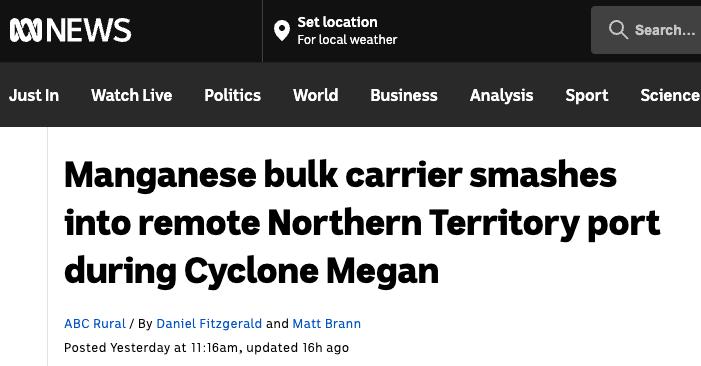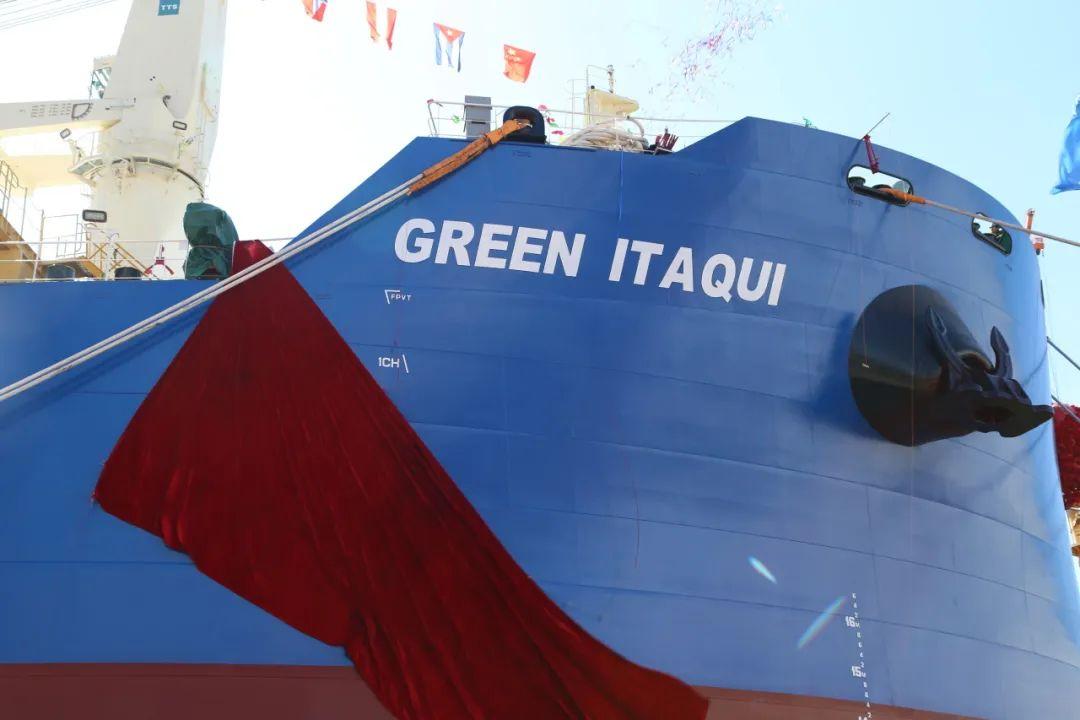《装卸时间与滞期费》第6版
CHAPTER 3 第3章
Commencement of laytime 装卸时间的起算
3.333 In The Happy Day, Potter LJ took a more positive view of waiver than Mustill LJ had in The Mexico I, and indeed found in the case in question that there had been a waiver and therefore the owners were not liable to pay despatch on the full amount of laytime allowed.
3.333相比The Mexico I案中Mustill大法官,在The Happy Day案中,Potter大法官对弃权理论采取更积极的态度,他确实是在那个争议的案件中认定是弃权行为,因此判定船东没有责任为整个允许的装卸时间支付速遣费。
3.334 It should be remembered that the factual circumstances of the two cases were somewhat different and of course the judgments must be read against those factual backgrounds. In The Mexico I, the vessel had reached its specified destination and the reason why notice of readiness in question was invalid was that the cargo which was the subject of the charter which Mustill LJ was considering, was overstowed by another cargo and therefore, on the face of it, there was no obvious way of anyone outside the ship knowing when the first cargo had been discharged and the ship was ready to discharge the second cargo. It would appear that the notice of readiness that was tendered was sent by telex when the vessel first arrived at the discharge port, and presumably was ‘‘accepted’’ at that time, some two weeks before the cargo was accessible and four weeks before discharge began. Mustill LJ’s comments quoted at para. 3.331 above must be considered against that background.
3.334 我们应该记得这两个案例的事实背景稍微有些不同,所以,法院的判决当然也必须根据它们事实背景一起解读。在The Mexico I案,船舶已经经抵达其指定的目的地,Mustill大法官认为,有关准备就绪通知书无效的原因是租船合同中货物倒装被其它货物压在下面。因此,事实上,船方之外的任何人都无从知道第一票货物卸完的时间以及何时船舶做好卸第二票货物的准备。准备就绪通知书似乎是在船舶首先到达卸货港口时通过电传发出的,大概在当时也被‘接受了’。大约2周之后玉米货物才可以卸下,但实际开始卸货时已经是过了4周时间。Mustill大法官的评论(在上文3.331段有引述)必须与其实际背景一同考虑。
3.335 By contrast, in The Happy Day, the problem was that the vessel had not yet reached its specified destination when notice was given. Once it did reach its specified destination, the vessel was in all respects ready to discharge its cargo. Clearly it is easier for an agent sitting in his office ashore to know when the ship has arrived than to know when an overstowed cargo has been discharged. Although, in this case, the notice of readiness was found not to have been accepted, had it been ‘‘accepted’’ with full knowledge that when sent, it was defective and had been accepted after that defect had been cured to the knowledge of the agents, it is possible that the owners might also have succeeded in some form of estoppel.
3.335 相比在The Happy Day案,问题是船舶在递交通知书时还尚未到达其指定的目的地。一旦船舶确实是抵达其指定的目的地,她就在所有各个方面都做好了卸货的准备。显然看出,对于坐在岸上办公室的代理人来讲,知道船舶到达的的时间相比较查询压在上面的倒装货物卸完的时间更为容易一些。然而,在该案,却认定准备就绪通知书还没有被接受。如果它被‘接受’并完全了解递交当时的情况,它也是有缺陷的接受。然后,如果通知书是在代理人知道缺陷已经纠正之后被接受的,那么,船东很有可能依据禁止翻供的形式获得胜诉。
3.336 In The Northgate the ship in question anchored at the outer anchorage at Sepetiba to await a berth. She did so because although she could have anchored at the inner anchorage that would have cost her owners more. Notice of readiness was tendered to and accepted by the loading terminal, who the court found were the proper party to receive it. It was accepted unconditionally although the court found that it was invalid because, under the terms of the charter, notice could only be presented at the outer anchorage when it could not be presented at the inner anchorage, although the terminal were not aware of the terms of the charter requiring this. In these circumstances, the court held the terminal must have been impliedly authorised by the charterers to waive any defect in the notice of readiness and that the terminal must have known which vessels were at which anchorage. On the day after the vessel arrived, the owners asked the terminal via the charterers’ agents to advise the date/time of acceptance of the master’s notice of readiness, which they did. The court held that that was an unequivocal representation by the terminal/the shippers that the notice had been accepted in the knowledge that the vessel was at the outer anchorage. The invalidity of the notice of readiness had therefore been waived and the owners’ claim for demurrage succeeded.
3.336在The Northgate案,有关船舶在巴西Sepetiba港的外锚地抛锚等待泊位。尽管她本可以在内贸地抛锚,之所以这样做是因为在内锚地费用更多。准备就绪通知书递交后就被装货码头接受了,该码头也是法院认定的通知书的合适接收方。尽管通知书是被无条件接受的,法院还是认定它是无效的,因为根据租船合同条文,通知书只有当其不能在内锚地递交时才能在外锚地递交,但码头方面是不知道租船合同对此要求的条文。在这种情况下,法院判定码头方面必须是被承租人的默示授权放弃通知书内的任何缺陷并且也必须是知道船舶已经在那一个锚地。在船舶抵达后的第二天,船东通过承租人的代理人向码头方询问船长递交的通知书接受的日期/时间,事实也是如此。法院判决:码头方/收货人清晰无误地表示通知书是被接受并且也知道船舶是在外锚地。因此,通知书的无效性被放弃,船东索赔滞期费成功。
3.337 The Vine was a similar case involving waiver, coincidentally in respect of events at the same load port. In this case, the charter required clearance from the port authorities to be given before notice of readiness could be tendered. This was in fact in this case given four days after notice had been accepted by the loading terminal. The statement of facts signed by the terminal recorded both when notice was accepted and when clearance was given. The judge following the earlier decision in The Northgate held that there was clear evidence of waiver of the requirement for port clearance by the terminal acting for the charterers.
3.337在The Vine案,也同样涉及到弃权方面。巧合的是有关情况发生在同一港口。在该案,租船合同规定要求在准备就绪通知书递交之前船舶必须清关。事实上,在该案,在码头方接受通知书之后4天才签发清关许可证。在码头签字的事实记录上同时记录有通知书接受的时间和许可证签发的时间。法官遵从早先的The Northgate案中的判决,裁定这有明显的证据显示码头方代表承租人放弃对港口清关的要求。
3.338 To summarise the law as it now stands:
A. A defective notice, whether it be one which is defective because the ship has not yet reached its specified destination or because the vessel is not ready to load or discharge the cargo in question, is prima facie invalid for all purposes.
B. There is no doctrine of inchoate notice, either in its pure form where it takes effect when the ship is ready, or in its modified form where the recipient knows or has the means of knowing when that is, although there may be an agreement with the recipient of the notice that it will be left with him, although then invalid, and will take effect when the vessel is ready, but this will require some overt act on the part of the ship to signify when this is.
C. If they don’t have express authority, agents may be shown to have implied or ostensible authority to waive requirements in the charter relating to presentation of notice of readiness, as well as receiving notices of readiness.
D. Even where no valid notice of readiness is presented, laytime may still commence by a bilateral agreement to vary the terms of the charter, by waiver or by estoppel by convention, by representation or by conduct. When it will commence will depend on which of these is applicable.
E. If no valid notice is ever submitted and there is no agreement, waiver or estoppel, commencement of cargo operations will not automatically trigger the running of laytime.
3.338目前,对这一问题的法律观点可以归纳如下:
A.在任何情况下,有缺陷的通知书,无论是否它是因为船舶还未抵达指定的目的地,还是因为船舶没有做好装卸有关货物的准备导致的缺陷,表面上都是无效的。
B.这不存在初步通知书的理论,无论是纯理论形式的,即,当船舶做好准备时就开始生效,还是更改形式的,即,接收人知道或者有办法知道船舶备妥情况,尽管可能会与接受人达成有一个协议(共识)并将还未生效通知书留在他处,于是,等待船舶准备就绪时即可生效,但这需要船方以某些明确的行为来表明何时是真正准备就绪。
C.如果代理没有明示的授权,也可以证明有默示或表面的授权放弃租船合同中有关递交通知书方面的条件要求,还有接收通知书方面的要求。
D.即使没有递交的是有效的准备就绪通知书,通过双边协议更改租船合同条文,通过弃权或者行为上的禁止翻供,通过陈述或者通过行动,装卸时间仍然可以开始起算。
E.如果曾经从未递交过有效的通知书,而且又没有协议、弃权、禁止翻供,即使开始卸货作业,也不会自动触发启动装卸时间时钟的转动。
3.339 Although probably not strictly necessary, since time lost by default of the owner would not normally count as laytime, to avoid doubt, the charterers might well be prudent to include some such clause as the following, which is part of clause 7 of Part II of the Bimchemvoy charter:
If after berthing the Vessel is found not to be ready in all respects to load or discharge, the actual time lost from the discovery thereof until she is in fact ready to load or discharge, shall not count as laytime.
3.339 尽管可能并非严格必要的,因为由于船东的过失所造成的时间损失通常不计为装卸时间,为了避免疑问,承租人完全可以慎重地加入下面这样的条款,这也是波罗的海航运公会推荐的化学品船航次租船合同第II部分第7条款的一部分内容:
如果靠泊后,发现船舶并未在各方面做好装卸货准备,则从发现其未备妥直到她实际上准备就绪的这段实际损失的时间,不得计入装卸时间。

《装卸时间与滞期费》购买链接(点击可购买)
海运圈聚焦专栏作者 魏长庚船长(微信号CaptWei)

 2019-03-15
2019-03-15 625
625 













